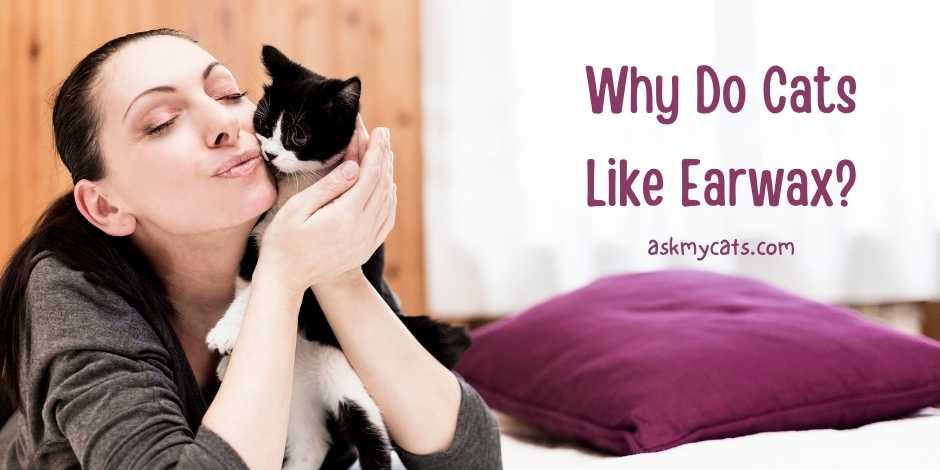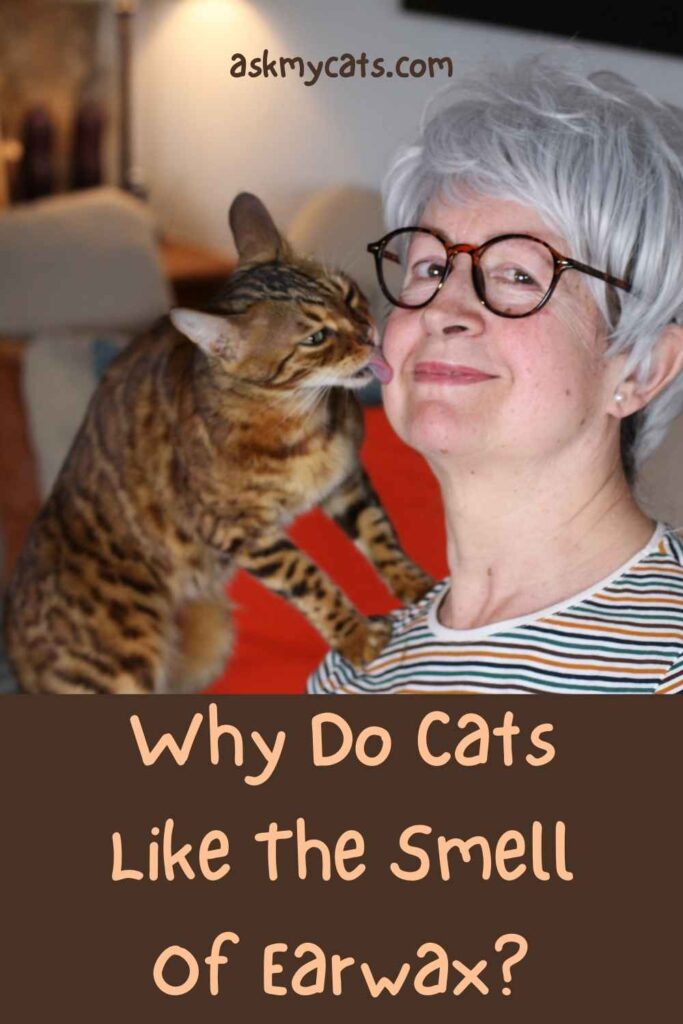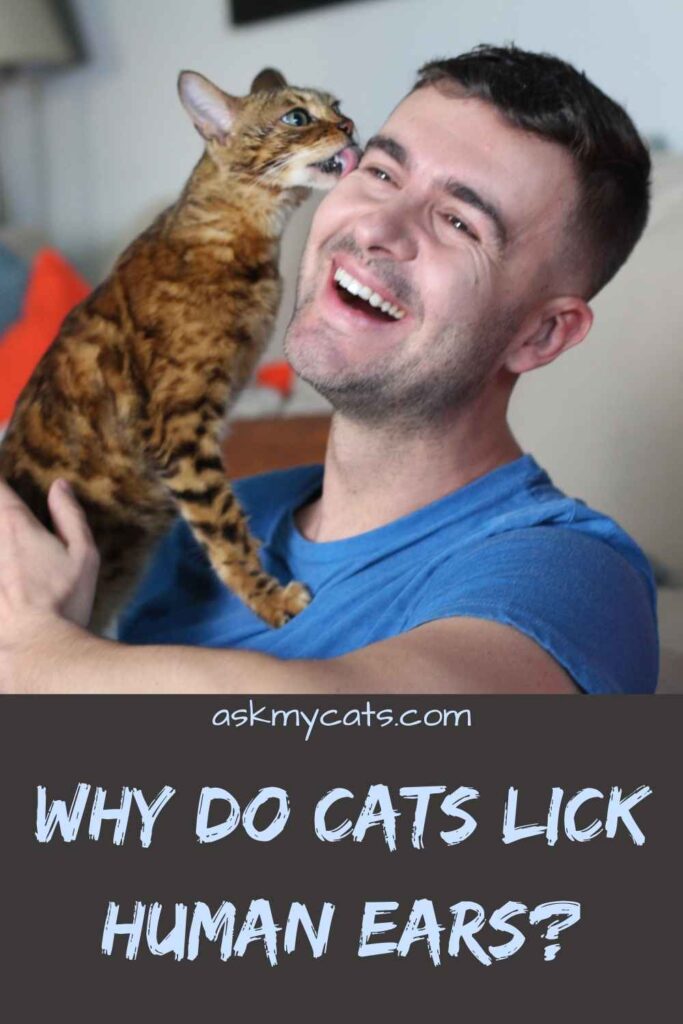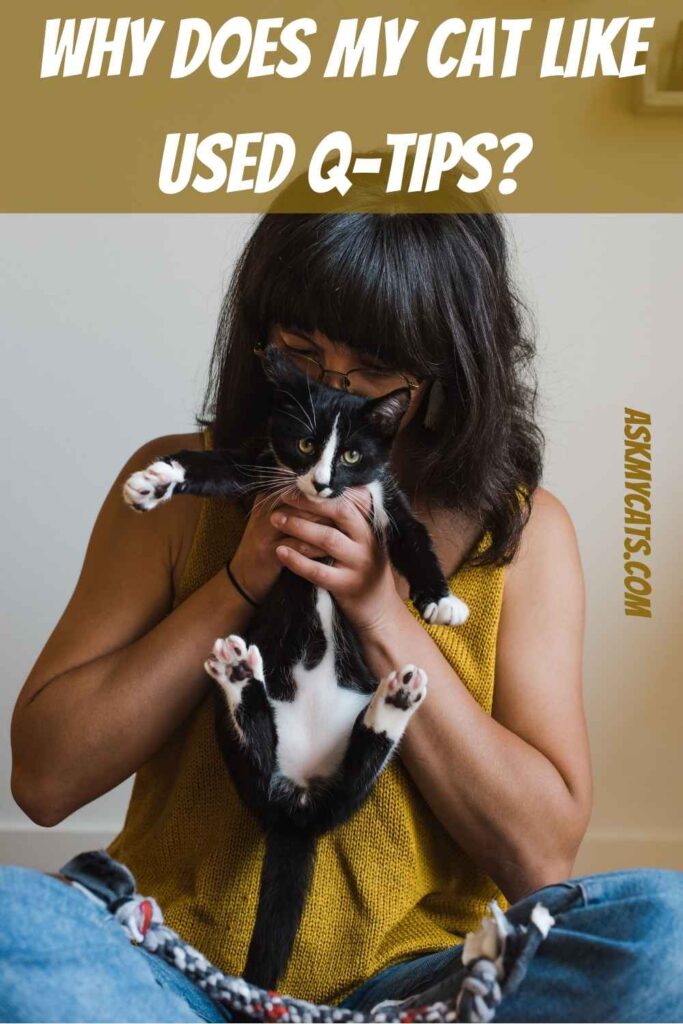Your cat can be fond of your own earwax when you discover that he has been chewing the Q-tips that you use to clean your earwax.
When you go into the room one day, your q-tips have been bitten down to the size of sticks. The cotton on the q-tip has been eaten clean off, and it’s all twisted and disgusting.
So, you’re probably wondering why cats prefer earwax?
Cats enjoy earwax because the aroma of the proteins in it stimulates their senses.
Let’s take a closer look at why are your loveable cats fond of your dirty earwax!


Give Your Cat the Perfect Day
Get the Free Ebook!
What’s Special About Earwax For Cats?
If your cat is so much attracted to your earwax, then something must be very special about it!
Dead skin cells that come off in the ear canal are one of the major components of earwax. After that, the dead cells are combined with gland secretions.
It’s understandable that you’ve never given much consideration to what’s within your earwax. For most people, it’s just another piece of garbage produced by your body.
Earwax contains dead skin cells from your ears’ inside. Earwax contains fatty acids as well as cholesterol. Take it out, toss it, and don’t worry about it again. However, there is more in your earwax than you may know.
Cats have around 500 taste buds, and their smell receptors considerably outnumber ours to compensate for their paucity of taste buds. The protein content of earwax attracts them, and they will lick another cat’s ears as a result.
So it appears that cats are unconsciously lured to licking earwax in each other’s ears and, according to a few posters, their owner’s dirty q-tips because the olfactory (scent) and brain receptors seek objects of nutritional value.
Male cats are seen to kiss his sister’s ears until she turns and slaps him, walks away, and looks furious. Her ears are most generally a vivid pink colour, and her fur on top of her head was spiked high.
Male cats had clearly grown excessive while licking her, which had enraged her. It was rather amusing, and she appeared little insane.
Earwax is produced by two distinct glands. The sebaceous gland is one, while the ceruminous gland is another. The ceruminous gland is in charge of excreting perspiration, which is a component of the earwax mixture. This gland is located in the external auditory canal.
The sebaceous gland differs somewhat in that it is found all over the body in places covered with hair. These glands will produce sebum, an oily material. These glands are located in the outer ear canal, where you may see hair.
This combination contains proteins, cholesterol, fatty acids, and, in most cases, hair. You now have the amazing combination of earwax!
Why Do Cats Like The Smell Of Earwax?
Cats have a fairly good sense of smell and are mostly attracted to the smell of fats and proteins that are present in the earwax.

Cats are drawn to fats and proteins, such as those present in earwax. Because cats have fewer scent receptors than dogs, their noses aren’t nearly as powerful.
Cats, on the other hand, may be more discriminating with their noses. This is because cats utilise their sense of smell to compensate for taste, much as how our own noses improve our dining experience.
If you’ve never done it before, try holding your nose while eating anything. When the aroma is eliminated, you’ll be surprised at how little you taste it.
Cats adore the smell of earwax, which you may take advantage of. Your cat companion will be unable to resist you if you push your finger in your ear and get some earwax on it. Even though the sound is highly revolting, it typically works.
When they catch a scent of the proteins in earwax, they can’t stop themselves from sniffing it. Cats recognise the fragrance because they can detect proteins in their meal.
Why Do Cat’s Like The Taste Of Earwax?
Earwax seems to be appealing to cats because of its nutritional value since animal proteins can be found in a lump of earwax.
These are antimicrobial peptides, ten of which have already been discovered in earwax by scientists.
Cats are attracted to the smell of animal proteins, which is why they lick earwax that contains them. Animal proteins are found in cat food as by-products from sources such as fish, poultry, and beef.
Earwax acts as a natural barrier, keeping dirt and bacteria out of the inner workings of your ears. It also serves as a lubricant and a barrier for your ear canal. It also has anti-insect properties.
The odour of earwax repels pests, but the stickiness captures those who enter by accident.
We think of earwax as unpleasant and disgusting. Finding a sticky yellow material in your or other people’s ears isn’t really exciting. Earwax, on the other hand, is extremely beneficial to our general health.
Taste buds exist in cats, but they do not function in the same manner that they do in humans. As a result, what kids want to consume may differ from what we want to consume.
Your cat may turn down a tasty food, but a good piece of earwax might be considered a delicacy.
Why Do Cats Lick Human Ears?
Cats may also lick your earwax as a kind of physical affection, similar to grooming.

Grooming is something that cats learn from their moms. They imitate their moms and begin grooming themselves as soon as they are a few weeks old. If they’re in a litter, they’ll probably lick and groom each other.
Cats groom themselves to heal wounds and remove dead skin cells, to disguise their scent from predators, and to keep their coat and skin lubricated.
Aside from earwax, some people believe it is a sign of your cat’s love. It’s possible that cuddling and rubbing themselves on you as a manner of demonstrating affection and effectively claiming you as their own has something to do with it.
A cat is lured to the aroma of earwax, which is one of the major reasons cats may lick a human’s ear.
This does not imply that you have a thick layer of earwax tempting your cat in for a snack. Their sense of smell is so keen that even a small quantity of earwax will pique their interest.
Grooming also expresses a cat’s affection for a human. Licking your skin is a means of claiming you, much like cats scratch particular spots to identify their territory. The licking identifies you as a member of the cat’s family and disseminates the cat’s smell.
Another explanation may be that they’re grooming you in some way. They’re cleaning you up and connecting with you by giving you kitty kisses, much like a mother cat does with her kittens.
However, the aroma of your earwax is the major reason they’re drawn to that location in the first place.
Why Do Cats Lick Each Other’s Ears?
Cats that are familiar with each other lick one other as a display of love or to bond.
When two cats thoroughly love and trust one other, they will engage in social grooming, also known as allogrooming.
They’ll only let this happen if they’re comfortable in each other’s presence. When one cat licks another, their scent is transferred to the other cat, thus strengthening and preserving their relationship.
It helps them maintain their deep friendship. These social grooming licks are frequently concentrated on the face, particularly the ears, which are a vital region for expressing love and affection.
The link between members of the same cat family may be maintained and strengthened by licking or brushing each other. By smelling each other, they will recognize each other as “family members.”
Apart from showing affection, licking helps to keep the family’s signature aroma. This can also be found in cats that have been raised together but are not biological relatives.
Cats are quite conscientious about keeping their hair neat and neat. They might spend hours making sure their coat is in tip-top shape. Detangling knots, cleaning up after a meal, and eliminating dust and debris collected up during the day are all part of the grooming process.
When dealing with a difficult-to-reach location or a persistent knot, having a feline companion on hand may be really beneficial.
If they detect a disease or disease, cats will groom one another. If one cat has a wound or a damaged portion of his or her body, or even an illness, another cat may lick the affected region. This might be with the purpose of assisting healing or providing comfort.
It’s often tough to tell the difference between playing and fighting. A true battle will be upsetting, with hissing, angry noises, and motions. The cats should be separated and the conflict should be stopped up.
Playing rough might include chasing, rolling around, and pawing each other. There will be no verbal distress, and both cats will return to their peaceful, happy selves once the game is complete.
Knowing that your cats may be drawn to each other’s ears, it’s critical to ensure that they’re in good health. If your cat licks another cat’s ears and they have ear mites, for instance, you’ll have a problem.
Ear mites are highly infectious, so if your cat is in close proximity to another cat’s ears, there’s a considerable risk they’ll catch them. That is not going to be a pleasant experience for your poor kitty. Their ears get extremely itchy and unpleasant as a result of this.
Is Human Ear Wax Good For Cats?
It’s not bad for them to taste some earwax because dead skin cells, fatty acids, and trace levels of cholesterol can all be found in earwax. These are proteins, and the aroma of earwax attracts cats and certain dogs.
Cats, in particular, are sensitive to the smell of animal proteins. Your cat’s saliva is full with bacteria that you don’t want to get into your circulation through any little cuts or abrasions.
Furthermore, two-thirds of cat allergies are caused by an allergen found in cat saliva. It’s not the safest idea to have a large dose of that allergy injected into your ear canal.
Additionally, cat breath is rather unpleasant, so you’ll want to remain your distance.
Why Does My Cat Like Used Q-tips?
Q-Tips are popular with cats because they are light, chewable, and fun to play with. Q-Tips are a popular toy with cats, but they can be hazardous if consumed.

The fact that a Q-Tip is tiny enough to fit in your cat’s mouth is the first reason why it may be eaten. If your cat doesn’t have to break it down into tiny bits first, he won’t have to work as hard to chew on it.
Because Q-Tips are chewy, your cat may be tempted to chew on and consume them. To put it another way, few varieties of Q-Tips are as hard as bone or hard plastic, so your cat could enjoy chewing on it. Your cat will break down the Q-Tip and begin to devour it if it is chewed on long enough.
Q-Tips join the list of fantastic toys that aren’t cat toys. Cats can manufacture a toy out of just about anything. If you’re wondering if Q-Tips and the cotton that comes with them are safe for cats, keep reading to find out.
Some cats like imitating their human’s actions. When a cat sees you using a Q-Tip, he or she may want to do the same, even if the Q-Tip ends up kicking under the bathroom vanity.
Your aroma is on even a discarded Q-Tip. Your Q-Tip will have your fragrance on it if your cat wants to be close to you and you aren’t home. It’s not you or your clothes, but it may come in handy in a situation.
Frequently Asked Questions
Why do cats love ear plugs?
Cats, in particular, are sensitive to the smell of animal proteins. So, it appears that cats are lured to licking earwax in each other’s ears, as well as, according to a few posters, their owner’s filthy q-tips, because their olfactory (scent) and brain receptors seek nutritional value.
Should I let my cat lick my ear?
While you may or may not think this charming, allowing your cat to do so is typically not a good idea. Cat saliva includes microorganisms that you don’t want to get into any scratches or tears in your tissue, and many cats have foul breath.
Why does my cat nibble my ear?
Cats usually chew on your ear because it is excellent for their teeth or mouth. If a cat is trying to get your attention, it will bite your ear. They may even bite your ear to coerce you into playing with them. They may even bite your ear to communicate with you.
What happens if a cat eats ear plugs?
The diameter of earplugs is the same as that of a cat’s small intestine. An ingested earplug will almost always lodge there and will need to be surgically removed. Earplugs are one of the most commonly encountered foreign bodies at Blue Cross Animal Hospital.
Final Words
Earwax is a delight for cats. The smell of all the dead skin cells, fatty acids, and cholesterol is simply too much for a cat to resist.
However, as a general safety precaution, you shouldn’t allow your cat go after the wax that’s still within your ears.
So, if you notice your cats scratching their ears excessively or stealing your old Q-tips, you’ll know why. It’s nothing to be concerned about.
Feel free to leave your questions in the comments section below!
